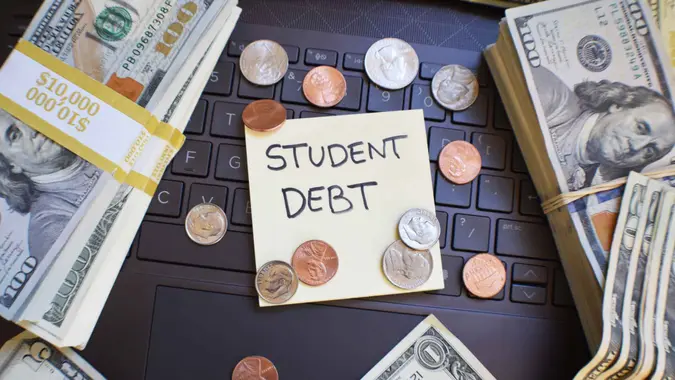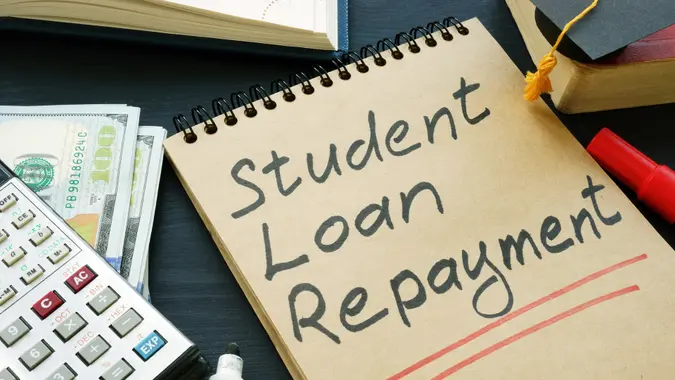This Common Student Loan Decision Could Jeopardize Your Retirement

Commitment to Our Readers
GOBankingRates' editorial team is committed to bringing you unbiased reviews and information. We use data-driven methodologies to evaluate financial products and services - our reviews and ratings are not influenced by advertisers. You can read more about our editorial guidelines and our products and services review methodology.

20 Years
Helping You Live Richer

Reviewed
by Experts

Trusted by
Millions of Readers
Student loan debt is a major expense for many Americans, and borrowers aren’t the only ones affected by it. Many parents and grandparents are also exposed to student debt because they have cosigned loans for younger family members. This not only puts the cosigners’ credit score at risk but could also jeopardize their retirement savings.
It’s hard to fault parents for wanting to help their kids out — especially in an environment of rising college costs and high inflation. The fact is, a large percentage of budding college students don’t have the financial resources to pay for college or the credit history to qualify for loans on their own. Research conducted by LendEDU found that about 90% of all private education loans are cosigned.
But there are things you should know before cosigning a student loan for a younger family member. One is that while cosigners aren’t primarily responsible for repaying student loans, their credit score will still take a hit when their children miss payments or default on the loans. Any issues with staying current on payments will be reflected on cosigners’ credit profiles.
When you cosign a loan, you also agree to repay the debt if the primary borrower fails to, according to Experian — and the loan will show up on your credit report even if you never make a payment. Credit issues can also contribute to financial problems in retirement if they linger into your senior years.
A LendEDU survey of 500 parent cosigners, conducted in February, found that more than half of respondents said their children have asked them for help making monthly payments. Another 65% said they provided assistance, and 34.4% said their children have made a late payment on cosigned loans. More than 56% believe their credit scores have been negatively impacted by cosigning on private student loans
These trends have left many parents with second thoughts about their decisions. More than one-third (35%) of respondents said they regret cosigning a private student loan. A similar percentage (34%) said they wouldn’t make the same decision again.
More than half of those surveyed (51.2%) said they felt that their children’s student debt is putting their retirement in jeopardy.
“Many parents rely heavily on their retirement savings after their working careers have ended,” LendEDU’s Mike Brown wrote in an April report. “With more than 90% of private student loans being cosigned, it is very possible that this generation of parents have or will have to put off retirement in order to mitigate the losses brought on by cosigning their children’s student loans.”
There are steps parents can take to avoid putting their retirements at risk. One, of course, is to not cosign a student loan in the first place.
But if you want to help out, you can find a lender that offers a cosigner release clause that absolves you of your legal responsibility to repay a loan if certain conditions are met. If it’s a private loan, the borrower might have to make a certain number of payments on-time and in full before the cosigner can be released.
Another option is to refinance the loan with another lender. As LendEDU noted, parents can be released as cosigners on private loans if their children refinance with private lenders.
 Written by
Written by  Edited by
Edited by 

























